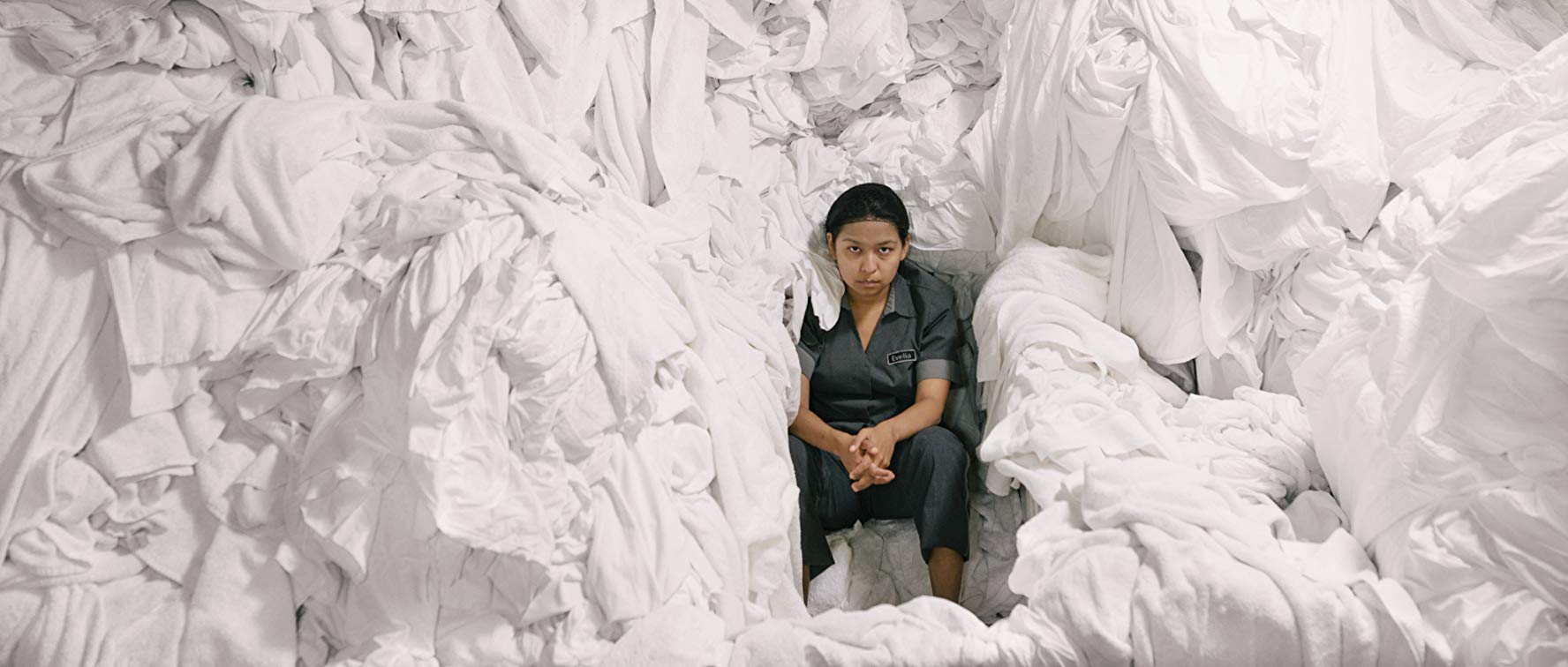Gabriela Cartol in The Chambermaid.
Together with screenwriter Juan Carlos Marquéz, director Lila Avilés adapted her own play that she had previously written for the stage. The original idea for it was born from her experience of a photographic installation by Sophie Calle, called ‘The Hotel’, that took place in 1981. It was a wise move as Lila Avilés proved to have an excellent eye in her choice of crew. The superb cinematography of Carlos Rossini and evocative sound by Guido Berenblum, coupled with the paced rhythm of editor Omar Guzman have all united to produce a beautifully crafted film that feels authentic.
![]()
Gabriela Cartol and Teresa Sánchez
The numbing repetitiveness of the chambermaid’s work is almost hypnotic and you find yourself expecting something awful to happen. This tension is sustained throughout, with sporadic interactions with fleeting characters that appear in corridors and bedrooms, imparting a powerful and sinking feeling of emptiness. Are these people real or are they figments of our imagination?
The opening scene is particularly strong as the chambermaid Eve (Gabriela Cartol) faces a room that looks as if it had been hit by a hurricane. Pragmatic and conscientious, she duly starts to tidy up the mess…socks, clothes… when she finally starts to clear the floor around the bed of the abandoned heap of sheets and duvets, she finds a comatose person lurking underneath. Like a surreal character that could have emerged from David Lynch’s ‘Twin Peaks’, this man can hardly communicate and seems like a cadaver returned to life. No Lazarus here though, Eve quickly excuses herself and leaves the room.
This might not be Tate Taylor’s ‘THE HELP’ but touches on similar themes. The disquieting invisibility of the maid and the painful lack of consideration while stuck in the relentless tedium of the job. With her overalls and hairnet, Eve has to work under huge pressure, obliged to carry a walkie- talkie around so that the supervisor can check up on her at all times. Avilés illustrates the amazing resilience that can be found in the human spirit expressed in the form of the powerful presence of Eve. There have been mentions of Alfonso Cuarón’s ‘Roma’, but despite a few analogies, it covers a very different emotional spectrum.
This is a minimalist and restrained portrayal, beautifully underplayed by this talented actress as she is ignored, taken for granted, pushed about, barely managing brief snatches of phone calls to check on her 4-year old child, who is being cared for by a friend and who she can almost never see. Eve is not a depressive, she understands her lot, but cannot resist dreaming of a better life. She is meticulous and conscientious in her work, wanting to better herself, even getting up extra early every day to go to adult school classes, only to find that they are suddenly stopped and disrupted by union activity. She then dreams of working on the exclusive penthouse, the 42nd floor, where the suites are like apartments and guests arrive in helicopters. Despite being promised a promotion to that floor where the perks are much higher, she is not selected, with no apologies nor redress. Her colleague Miriam, nicknamed Minitoy (the superb Teresa Sánchez) turns out not to be reliable. In the only scene that Eve dares to expresses her true feelings, she has to cry and suffer hidden in a laundry room surrounded by mountains of sheets that fail to cushion her grief.
![]()
Gabriela Cartol
Yet, the strength of the film lies in the subtlety, the gentle humour and the richness of the details that speak reams of the lives of these invisible helpers that make these hotels successful, including the irony of her situation and the interactions with the few guests that she comes across. One guest actually compliments her, but in such a manner as to deprive the flattery of all value, being superficial and probably designed to make the guest herself feel she is being ‘good’ to the staff. She is a rich Argentine girl with a young baby who complains of feeling ‘tied’ to her hotel room while her husband works: -
“I need a bit of a life of my own” she wails, unaware of the awful irony as she takes advantage of Eve’s good will.
The quiet and shy Eve has an admirer in the form of the window cleaner who draws hearts in the soap on the outside of the massive windows, as he dangerously dangles in his work- cradle on the 21st floor! Being teased at every turn, she avoids him in the canteen but takes an opportunity, when it appears, to tease him back. You find yourself willing her to rebel and eventually she does… in private… expressing her despair and frustration, but the real tragedy of her situation is revealed. We see that she cannot really afford the childminder, her promises to pay hang on her hopes for the promotion that fails to materialize. She works such long hours that she sometimes has to sleep at the hotel, but she still cannot stop herself falling into debt. Who really benefits here?
As critic Peter Bradshaw says “it’s about the emotional cost of submission”. Easy to say if she could have avoided it, but she is lucky to have a job at all.
‘The chambermaid’ is a very moving portrait that remains with you, for those who never had ‘help’ it could even be very informative. So easy never to notice when you go into an hotel and find everything neat and tidy, to forget someone was there, preparing it for you, and we remain unaware of their sacrifice.
THE CHAMBERMAID (2018) is on at selected cinemas from July 26th 2019.
Director Lila Avilés
Writing Credits Lila Avilés, Juan Carlos Marquéz
Cinematographer Carlos Rossini
Sound Guido Berenblum
Editor Omar Guzmán
Production Lila Avilés/ Tatiana Graullera
Prod company Bambú Audiovisual/ Amplitud/ La Panda
Cast: Gabriela Cartol, Teresa Sánchez, Agustina Quinci















